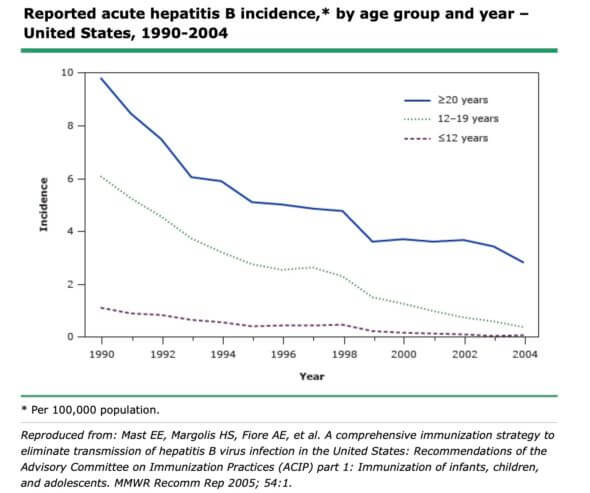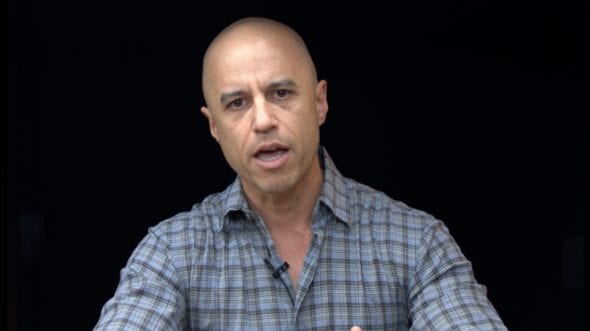Many parents have asked me: why does my baby need a hepatitis B shot right after birth?
Is this kid gonna go out and have sex and do IV drugs? Why subject them to this shot so early?
Here’s why.
Hepatitis B is a serious disease caused by a virus that can damage the liver, leading to serious and potentially life threatening complications including liver failure and hepatocellular carcinoma (liver cancer). Most people who are infected don’t even know they have hepatitis B, and find out either when they get sick, or when they are screened (as pregnant mothers are recommended to be) for hep B.
Newborns can be infected via transmission from their mother during birth since the virus is transmitted through blood and body fluid contact. Some mothers aren’t screened for hepatitis B, or become infected after the screening and can pass on infection to their newborns. Additionally, household contacts (family and friends) can infect the child more easily than you might think. Many of these contacts don’t even know they’re infected.
If newborns and children do get exposed, 90% of them will carry the virus for life (there is currently NO CURE for hep B) and 25% of these will, during their lifetimes, suffer complications from liver disease or cancer.
Does the vaccine work?
Yes! Watch the video for full details or check out this excellent guide, but the vaccine is very safe and effective, and 95% of infants achieve immunity after 3 doses of a properly spaced vaccine. In fact, it’s been studied in trials with 30 year followup and has been shown to decrease liver cancer rates and improve outcomes. The most common side effects? Redness and/or swelling at the injection site or low-grade fever. Kind of a small price to pay for not dying of liver disease!
And check out the figure below to see how amazingly hepatitis B infection rates have declined since newborns began receiving the vaccine in the 90’s. #SCIENCE!

You can check out the original video here on Facebook and leave your comments and questions. Share this video with parents on the fence about this vaccine.
If you’re running short on bandwidth and phone battery life, you can listen to the optimized audio-only podcast version here on iTunes and Soundcloud.
https://www.facebook.com/ZDoggMD/videos/382647499149788/
What is going on ZPac? It’s it’s your boy Dr. Zubin Damania aka ZDoggMD. Today I look like some kind of weird Jordan Peterson professor because Tom made me dress up because we’re talking about something very important which is hepatitis B vaccination and we wanna keep it legit.
Quick bit of housekeeping, if you become a supporter, click the little button become a supporter, you get exclusive access to videos with me and now we’re gonna be offering CME and CEU credits for doctors and nurses and others just for watching our videos. You can click through and get the credit. So get your learn on, get exclusive content, and help support our mission which is to educate and entertain.
All right, many, many, many people have messaged me, mothers, asking this question. Why is it that my newborn infant, right after birth within 24 hours, gets an injection of a hepatitis B vaccination? Isn’t it too early, isn’t the infant so immature that there’re not, their immune system can’t handle the toxins of the vaccine, and isn’t a child, an infant not gonna go out, presumably, and have sexual intercourse and do intervenous drugs, isn’t that how you get hepatitis B. I don’t understand it, I’m inclined to refuse this vaccine.
Now here’s the thing. This vaccine, hepatitis B, as a series, is given right after birth within 24 hours for most babies unless they’re less than two kilograms and they’re premature, and then again at one to two months, and then again at six months. So it’s a three vaccination series. It is, without a doubt, one of the great success stories in the history of science and keeping our children safe.
Let me back up. What is hepatitis B? It’s a virus, a DNA virus that actually infects a ton of people worldwide, on the orders of hundreds of millions. And this virus, over time, so if you catch it as an adult, there’s a chance you’ll actually clear it away after an acute infection and maybe get better, but there’s a smaller chance that you will actually become a chronic carrier, you’ll hold on to this virus, it’ll live with you, and over time can cause inflammation and problems in the liver that can lead to liver failure as an adult, and even more terribly, actually, liver cancer. So there’s something about the interaction with the virus and the inflammation in the liver that can promote the formation of liver cancer.
Now, over the millennia this has killed scores of human beings, but here’s the thing. If you pick up this virus as a infant, as a child, you are more likely, nine out of 10, to carry it chronically. And those children have something like a 25% lifetime risk of having end stage liver disease or liver cancer. Think about that. If you pick it up as a child it’s more dangerous.
Now, the question is, how do you catch it? Well, yes you can get it from sexual intercourse, you can get it from body fluid contact, and blood contact. But that can happen from something as benign as sharing a toothbrush with someone who’s infected.
Now why should we worry about this? Because most people who are infected have no symptoms initially and they don’t even know they’re infected, they don’t even know they’re carrying the virus. Now, imagine you’re a pregnant mother.
Now, we’re supposed to screen that, you know, US Preventative Task Force Service, tells people that you should screen every pregnancy, every mother, for hepatitis B infection, but sometimes things fall through the cracks or you get infected after you’ve been screened. You can get this transmission in a vertical way, meaning from mother to child. It doesn’t happen, typically, across the placenta, in other words while the baby’s in the belly. It typically happens during birth when all this blood and fluid is exchanged, or during early childhood when there’s exposure between mother and child because of close contact.
So one way you can get it is from mom and mom may not even know she’s infected. In which case, again, the early vaccination right after birth and then the series to complete it often leads to life long immunity against hepatitis B. And this has been studied out years, 30 years, since the early trials, particularly in Taiwan because hepatitis B is a huge problem in certain Asian countries, vertical transmission. And then adult liver failure and adult liver cancer. So, in the setting of this, the other way that little babies can catch hepatitis B, and again not even know that it’s happening, is a family member who’s undiagnosed and is a carrier or a caregiver, like a nanny, a babysitter, or friend, and all it takes is an exchange of fluid, maybe it’s saliva over an open wound, you never know, but we, how many people take our babies and just, including friends and caregivers, and all that. And so if you’re infected as a child, the consequences as an adult, and even as a child, can be catastrophic.
Catastrophic, we’re talking, listen, I take care of people with end stage liver disease, it is the worst way to die that you can imagine. You are jaundiced, your belly fills with fluid, you’re confused and encephalopathic, it is horrible, and you bleed. Liver cancer is a horrible way to die. Many people in this sort of anti-vaccine advocacy community, right, the anti-vaccine industrial complex, say that well, these vaccines aren’t studied.
Wrong, for hepatitis B, it turns out that there are 30 years of follow up data on randomized controlled trials that show that we have managed to cut the infection rate using hepatitis B by 94% in the United States since we started immunizing in the ’90s, 94%. In Taiwan, looking back in 1984, controlled trials of vaccination versus no vaccination actually show that they’ve dropped liver cancer and end stage liver disease by a tremendous percentage.
This is a vaccine that works. What are the adverse events on our babies? Redness at the site of injection, low grade fever. One in 1.1 million babies could have an anaphylactic reaction, meaning an aggressive immune response to the vaccine, but they’re usually in the hospital and that can be managed. So this vaccine is not only safe, it is absolutely effective at keeping your child safe from a virus that many people don’t know they have that can kill you as an adult in a horrible way and by preventing the child from getting the infection as quickly as we can, it prevents the child from spreading the infection to other people, because of course the child often doesn’t know they’re infected.
So here’s the call to action. If you’re having a baby, if you know someone who’s having a baby, there’s a reason we’re doing the show. This is a vaccine that is misunderstood that people have an emotional reaction, why are you giving my baby this vaccine so quickly, it is so important that it’s given right away and on schedule because it’s the best way to keep your child safe. And ultimately, that’s what we all share in common. We want our children to be safe.
I hope we’ve explained the scientific rational for why. This is a very studied vaccine, and I hope there’s an emotional connection because we can actually do something to prevent cancer, prevent liver disease, and prevent an infectious disease that has been a scourge on humanity since time immemorial. And we can do it to keep our own babies safe, it’s one of the first acts of love, short of putting your baby onto your chest after its born, it’s protecting them with this vaccine.
So the call to action, please send this video to someone you care about, someone who’s on the fence about that particular vaccine, leave a comment, share the video, become a supporter, and we can get more CME credit for this and continue our educational mission. And we out, I love you guys.
Category
- The ZDoggMD Show (817)
- Featured Videos (189)
- Doc Vader (142)
- Against Medical Advice (128)
- Medical Humor (95)
- Public Service Announcements (87)
- Music Parodies (74)
- Nurses (59)
- Meditation (45)
- The VPZD Show (38)
- ZVlogg (36)
- ZTalks (28)
- ZBlogg (24)








